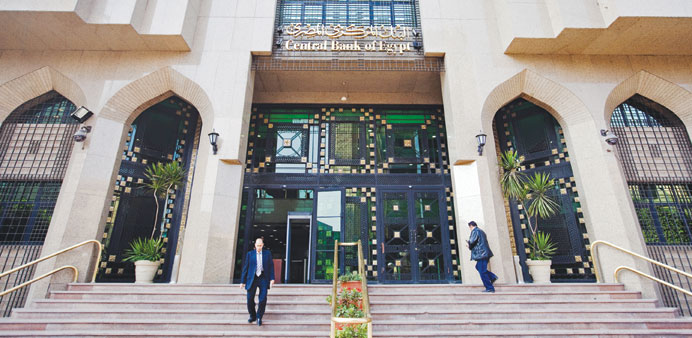Pedestrians use the stairs outside of Egypt’s central bank in Cairo. The bank said it would sell $1.5bn from its foreign reserves to cover strategic imports such as wheat, meat and cooking oil, in its largest ever exceptional currency auction.
Reuters/Cairo
Egypt’s central bank restocked the market with much-needed dollars, moving to ensure a steady flow of imports of staple foods against an increasingly volatile political backdrop.
The bank said it would sell $1.5bn from its foreign reserves to cover strategic imports such as wheat, meat and cooking oil, in its largest ever exceptional currency auction.
It has been running down its hard currency reserves to prop up the Egyptian pound, but its coffers have been boosted by aid payments from Gulf states that support the military-backed government.
As the pound weakens, street prices of basic imported goods rise - ratcheting up already high political tensions and a symptom of the economic crisis that has gripped the nation since an uprising in 2011 overthrew Hosni Mubarak.
The auction dwarfs the $40mn currency sale Egypt holds three times a week, and is also larger than the $1.3bn the central bank offered at its last exceptional auction in September. It would address a shortage of dollars that has hampered importers as well as fuelling an unofficial currency market.
“The timing of the auction is important in light of the price of the dollar in the black market and the volume of orders at banks to provide for strategic products,” a central bank official told Reuters.
The currency auctions began during ousted president Mohamed Mursi’s year in office, helping support the pound as tourists and investors took their hard currency elsewhere, giving rise to a black market.
A trader said the dollar was offered at 6.96 Egyptian pounds on the official market yesterday and at 7.37 pounds on the black market.
“The central bank intervened at the right time... This auction will narrow the gap between the dollar in the official market and the parallel market,” Mohammad al-Atrabi, chief executive of Egyptian Gulf Bank told Reuters. The currency sale coincided with the promotion to field marshal of army chief General Abdel Fattah al-Sisi, fuelling speculation he will run for president.
The presidential vote will precede parliamentary polls, authorities said on Sunday, a day after dozens died in anti-government marches on the third anniversary of Mubarak’s fall.Egypt’s central bank closed 13 bureaux de change last week for up to eight weeks for manipulating foreign currency prices in the black market, an official at the central bank told Reuters.
Three years after the fall of Hosni Mubarak, Egypt’s political future is uncertain but its economy may have stabilised enough to fuel a strong recovery of its financial markets this year.
But the stock market is largely ignoring such events; up 61% from last June’s low. These are signs that for many investors - including some foreign ones - the country has turned the corner. “Egypt is reaching a ‘new normal’ in which the environment is not perfect but it is better than it has been for several years,” said Sherif Salem, portfolio manager at Abu Dhabi investment firm Invest AD.
He and other fund managers see three planks to the recovery. Although deep political fissures in Egypt have not closed, this month’s referendum approving a new constitution has cleared the way for presidential and parliamentary elections.
So by the end of 2014, Egypt may have a democratically elected government for the first time since the army deposed Islamist President Mohamed Mursi last July, a year after he was voted into power.
In a throwback to the Mubarak era, the president may be a military man, Abdel Fattah al-Sisi, now promoted to field marshal, but many would welcome him as offering stability.
Secondly, Mursi’s chaotic government has been replaced by a technocratic cabinet of experienced economic policy-makers. And thirdly, for the first time since Mubarak left, Egypt has money to spend on rebuilding the economy, thanks to more than $12bn of aid promised by Gulf Arab states after Mursi left.
In at least one way, the outlook for Egypt is actually better now than it was in early 2011: the global economy is stronger, Salem said.
“I’m hearing in my conversations with bankers that for the first time, multinationals and other big companies have budgeted for capital spending this year” in Egypt, he said.
The economic recovery may not be fast. The International Monetary Fund projects growth of 2.8% this year, up from 1.8% in 2013 but well below the roughly 5% which analysts say is needed to cut youth unemployment, estimated at around 20%.

